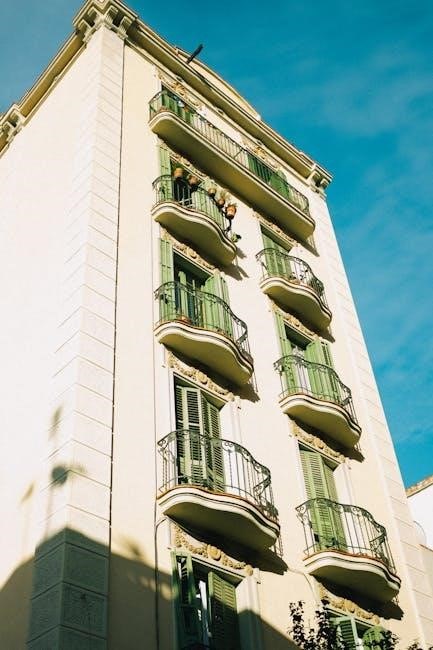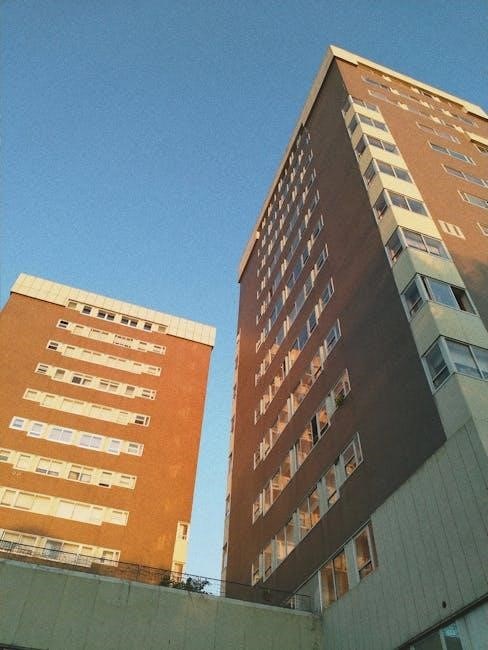New Jersey’s 2024 property tax rates remain among the highest nationwide‚ with significant variations across towns. Factors like assessed values and municipal budgets influence these rates‚ impacting homeowners’ financial planning. Detailed PDF reports and online tools provide insights into specific town rates‚ helping residents and investors make informed decisions.
1.1 Overview of Property Tax System in New Jersey
New Jersey’s property tax system calculates rates based on assessed property values and municipal budgets. The General Tax Rate‚ expressed per $100 of assessed value‚ varies by town‚ with 2024 rates like West New York at 8.259%. The Effective Tax Rate enables comparisons across districts. The average tax bill exceeded $10‚000‚ reflecting high property values and local costs. Detailed PDF reports provide town-specific data for 2024.
1.2 Importance of Understanding Property Tax Rates by Town
Understanding property tax rates by town is crucial for homeowners and investors to budget accurately and make informed decisions. New Jersey’s varying rates‚ with towns like West New York at 8.259%‚ highlight significant disparities. This knowledge helps residents anticipate costs‚ compare towns‚ and plan financially‚ especially with the average tax bill exceeding $10‚000 in 2024.

Highest Property Tax Rates in New Jersey Towns for 2024
New Jersey’s 2024 property taxes are among the highest nationwide‚ with towns like West New York and Bergenfield leading. The average tax bill exceeds $10‚000.
2.1 Top 10 Towns with the Highest Property Tax Rates
In 2024‚ Millburn leads with an average tax bill of $24‚947‚ followed by Tenafly at $23‚031. Other towns like Montclair‚ Glen Ridge‚ and Demarest also rank high. Tax rates are influenced by rising property values and municipal costs. Detailed PDF reports reveal town-specific data‚ enabling comparisons and insights into New Jersey’s costly property tax landscape.

2.2 Notable High-Tax Towns: West New York and Bergenfield
West New York Town has a General Tax Rate of 8.259‚ making it one of the highest in 2024. Bergenfield also stands out with elevated tax rates. These towns reflect New Jersey’s costly property tax landscape‚ driven by rising property values and municipal expenses. Detailed data in official PDF reports provide further insights into these high-tax areas.
Lowest Property Tax Rates in New Jersey Towns for 2024
New Jersey’s lowest property tax rates in 2024 are found in towns like Walpack Township‚ with a rate of 0.666 per 100 of assessed value‚ showcasing significant regional variations.
3.1 Towns with the Lowest Property Tax Rates
In 2024‚ towns like Walpack Township and Hopewell Township boasted the lowest property tax rates in New Jersey‚ with Walpack at 0.666 per 100 of assessed value. Cumberland County‚ the state’s poorest‚ saw the lowest average bills at $4‚840. These areas demonstrate significant regional variations‚ offering relief in a state known for high property taxes‚ though rates remain relatively high compared to national averages.

3.2 Exceptional Case: Walpack Township
Walpack Township stands out as an extreme outlier‚ with a remarkably low tax rate of 0.666 per 100 of assessed value in 2024. This rate‚ significantly lower than statewide averages‚ reflects the town’s limited property values and sparse population. It highlights the vast disparities in tax burdens across New Jersey‚ offering a rare example of affordability in a high-tax state.

Average Property Tax Rates and Bills in New Jersey for 2024
New Jersey’s average property tax bill exceeded $10‚000 in 2024‚ with a statewide tax rate of 2.446 per 100 of assessed value‚ reflecting rising property values and municipal costs.
4.1 Statewide Average Property Tax Bill
New Jersey’s average property tax bill for 2024 surpassed $10‚000‚ marking a 3% increase from the previous year. The statewide average tax rate was 2.446 per 100 of assessed value‚ driven by rising property values and higher municipal costs‚ making it one of the highest in the nation.
4.2 County-Level Comparisons
In 2024‚ New Jersey counties showed significant variation in average property tax bills. Essex County led with over $12‚000‚ while Cumberland County averaged around $4‚840. These disparities stem from differing local budgets and property valuations. Detailed county comparisons are available in official 2024 PDF reports‚ providing insights into regional tax trends and variations.

Factors Influencing Property Tax Rates in 2024

Property tax rates in New Jersey for 2024 are shaped by assessed property values‚ municipal and county budgets‚ and local economic conditions. These factors vary by town‚ leading to diverse tax rates across the state.
5.1 Assessed Property Values
Assessed property values play a crucial role in determining tax rates‚ as they form the basis for tax calculations. Higher assessed values typically lead to higher property tax bills. In 2024‚ New Jersey’s average home value was approximately $382‚988‚ directly influencing tax rates across towns. Variations in assessed values explain why some municipalities‚ like Millburn and Tenafly‚ experienced higher tax rates due to elevated property values.
5.2 Municipal and County Budgets
Municipal and county budgets significantly influence property tax rates‚ as local governments rely on these taxes to fund public services and infrastructure. Rising property tax rates in towns like West New York and Bergenfield reflect increased municipal spending. Detailed PDF reports reveal how budget allocations impact tax rates‚ providing transparency for residents and guiding financial planning decisions.

How to Find Property Tax Rates for Specific Towns
Access detailed property tax rates for specific New Jersey towns through official PDF reports published by the Division of Taxation. Online tools also offer tax rate comparisons and calculations.
6.1 Accessing Official PDF Reports
Official PDF reports detailing New Jersey’s 2024 property tax rates by town are available on the Division of Taxation’s website. These documents provide town-specific tax rates‚ enabling precise calculations. Residents can download the reports to review detailed tax information‚ ensuring accurate budgeting and financial planning. The PDFs are updated annually‚ offering the most current data for informed decision-making.
6.2 Online Tools and Calculators
New Jersey offers online tools and calculators to estimate property tax bills and compare rates across towns. These resources provide detailed insights into tax rates‚ allowing homeowners and investors to plan budgets effectively. By inputting assessed values and tax rates‚ users can calculate annual tax bills‚ ensuring accurate financial planning and understanding of tax implications.
Tax Relief Programs and Exemptions in 2024
New Jersey offers various tax relief programs and exemptions in 2024‚ including options for seniors‚ veterans‚ and low-income residents‚ helping reduce property tax burdens for eligible homeowners.

7.1 Available Relief Programs
New Jersey provides several tax relief programs‚ including the Homestead Rebate and Senior Freeze‚ offering reductions for eligible homeowners. Veterans and disabled residents also qualify for exemptions. These programs aim to ease the burden of high property taxes‚ with specific income and ownership criteria determining eligibility. Residents can apply through state forms or local tax offices to benefit from these relief options.
7.2 Eligibility Criteria
Eligibility for New Jersey’s tax relief programs varies by initiative. Income limits‚ property ownership‚ and residency requirements are common criteria. For example‚ the Senior Freeze program requires applicants to be 65 or older and meet income thresholds. Veterans must provide proof of service‚ while disabled individuals need medical documentation. Each program outlines specific conditions to ensure tailored support for eligible homeowners.
Historical Trends in New Jersey Property Tax Rates
New Jersey property tax rates have shown a steady increase over the years‚ with the average tax bill surpassing $10‚000 in 2024‚ reflecting rising property values and municipal costs.
8.1 Year-over-Year Changes
New Jersey property tax rates have consistently increased annually‚ with the average tax bill rising by over $300 in 2024. This trend reflects rising property values and higher municipal costs. Specific towns‚ like Millburn and Tenafly‚ saw significant spikes‚ while others experienced more moderate growth. The year-over-year changes highlight the ongoing financial pressures on homeowners across the state.
8.2 Long-Term Trends
New Jersey’s property tax rates have shown a steady‚ long-term increase‚ with rates rising from 2.271 in 2020 to 2.446 in 2024. This upward trend reflects growing property values and escalating municipal costs. Over the years‚ towns like Millburn and Tenafly have consistently high rates‚ while others like Walpack remain exceptions with notably lower taxes. The sustained growth underscores the ongoing financial challenges for homeowners and local governments.
Impact of Property Tax Rates on Homeowners and Budgeting
New Jersey’s rising property tax rates significantly impact homeowners‚ increasing financial burdens and necessitating careful budgeting to accommodate growing expenses and maintain financial stability.
9.1 Budgeting for Property Taxes
Budgeting for property taxes in New Jersey requires careful planning due to high rates. Homeowners should account for annual increases‚ with the 2024 average tax bill exceeding $10‚000. Reviewing official PDF reports and online tools helps estimate costs accurately. Town-specific data‚ like Millburn’s $24‚947 average‚ highlights the need for tailored financial strategies to manage these significant expenses effectively.
9.2 Strategic Planning for Tax Implications
Understanding New Jersey’s 2024 property tax rates by town is crucial for strategic financial planning. Homeowners and investors should analyze town-specific data‚ like West New York’s 8.259% general tax rate‚ to anticipate future costs. Consulting local tax officials and leveraging online tools can provide insights for mitigating tax burdens. Proactive planning helps in allocating resources effectively and avoiding financial surprises.
New Jersey’s 2024 property tax rates highlight significant variations across towns‚ with high rates in areas like West New York. Future outlook suggests continued increases‚ driven by rising property values and municipal costs‚ prompting homeowners to closely monitor updates for 2025 and beyond.
10.1 Summary of Key Points
New Jersey’s 2024 property tax rates remain among the highest in the U.S.‚ with significant variations across towns. The average tax bill exceeded $10‚000‚ driven by rising property values and municipal costs. Towns like West New York and Bergenfield saw notably high rates‚ while others like Walpack Township had exceptionally low rates. Detailed PDF reports and online tools provide town-specific data‚ essential for planning and understanding local tax trends.
10.2 Expectations for 2025 and Beyond
New Jersey property tax rates are expected to rise in 2025‚ driven by increasing property values and municipal budget demands. The 2025 tax rates will be finalized in mid-July‚ with potential stabilization in some areas. Homeowners should anticipate continued high bills‚ though relief programs may offset some costs. Long-term trends suggest sustained upward pressure on property taxes due to economic and demographic factors.